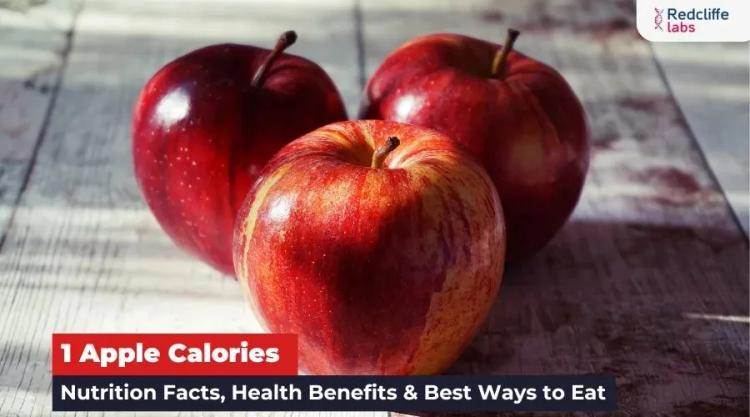Benefits of Apples - Health Advantages of Eating Apples

Medically Reviewed By
Dr Divya Rohra
Written By Muskan Taneja
on Jul 9, 2024
Last Edit Made By Muskan Taneja
on Jul 19, 2025

Do you know India produces over 2.4 million metric tons of apples yearly?
Yes, that’s the number of apples being produced and consumed.
But is there any benefit to consuming apples?
Fortunately, many!
An apple can help lower the risk of developing cancer, diabetes, and heart disease.
In this blog, we will help you understand the health benefits of Apple.
Are Apples Healthy?
There are several varieties of apples, such as Red Delicious, tangy green, and many more. Each apple contains around 60 calories of nutrients and benefits. It helps in keeping humans healthy. Among all the varieties, red apples may be the healthiest apples. But, all apples are rich in nutrients, including:
- Fiber: Apples are a rich source of fiber, which aids digestion.
- Antioxidants: Apple peels are rich in quercetin, a nutrient found in citrus fruits, berries, green tea, and red wine.
- Water Content: Apples are made up of 85% water. It is a hydrating snack when consumed raw, peeled, and whole.
Here is a table showing nutritional components in every 100 gm.
|
Nutritional Component |
Amount (every 100 gm) |
|
Fat |
0.2 gm |
|
Fiber |
2.4 gm |
|
Sugar |
10.4 gm |
|
Carbohydrates |
13.8 gm |
|
Protein |
0.3 gm |
|
Water |
86% |
|
Calories |
52 kCal |
Also read - https://redcliffelabs.com/myhealth/fruit/water-apple-benefits-uses-side-effects-and-more/
Top 10 Health Benefits of An Apple
There is a popular saying, ‘An apple a day keeps the doctor away.’ This saying is based on the nutritional benefits of apples. Join us as we explore the health benefits of apples.
Control Blood Sugar:
Apples are fiber-rich and low in sugar, which helps keep your glucose level steady. A research database of over 38,000 people has found that consuming an apple daily can help reduce the chances of type 2 diabetes risk, because of the polyphenols present in apples. However, the recommended fiber content is 14 grams for every 1,000 calories consumed for optimal health. A medium apple contains around 4.8 grams of fiber. Eating one or two apples a day can help you attain the recommended fiber intake.
Maintain Low Cholesterol:
High cholesterol means a higher risk of heart disease. High cholesterol clogs arteries, eventually restricting blood flow to the heart. Whereas an apple contains antioxidants and fiber, which help lower the number. ‘Pectin’ is an apple nutrient that helps bind cholesterol in digestive tracts and flush it out.
A study of several people with high cholesterol levels showed a reduction of about 5%- 8%. In contrast, another study showed that a participant reduced 13% of cholesterol in six months after eating apples daily. Add 3 ounces of dried apples (no sugar added) to your daily diet.
Reduce Blood Pressure:
Apples help lower blood pressure. High blood pressure can damage blood vessels and lead to stroke and heart attacks. A healthy and balanced diet can help prevent it. Studies show that apples help lower blood pressure. Apple peels have antioxidants that help reduce the chances of high blood pressure. They also ensure smooth blood flow, which reduces blood pressure.
Boost Microbiome:
Microorganisms are present all over your body. Apple contains nutrients that help strengthen your gut and skin. There are mixed theories about whether apples are beneficial or harmful.
Quercetin in apples stops harmful microbes from growing in the gut, while pectin is a prebiotic that promotes good gut health.
Satisfies Hunger Longer:
Apples are low in fat and high in fiber and water, making them a filling snack. Their nutrient value is well-balanced, keeping you full. Choose an apple instead of a cookie, candy, or sugary food. It will help you stay full while maintaining a healthy weight.
Help in Weight Loss:
Apples are full of water and fiber and are enriched in nutrition. In different studies, one whole apple can reduce gastric emptying (the rate at which the stomach empties). Apples can also help reduce BMI, a huge factor in heart disease. Additionally, polyphenols may also have anti-obesity effects.
If you are planning to lose weight, add apples to your diet daily.
Good For The Heart:
Apples have the chance of reducing heart disease. Research has found that 100-150 g/d of whole apple can help reduce heart disease and high blood pressure. One reason is they are soluble fiber, which is associated with lowering the chance of heart disease. Another is it has polyphenols, which are associated with reducing blood pressure. Studies have also shown that eating apples can reduce the possibility of stroke.
Promote Gut Health:
Apples have pectin, which acts as a prebiotic in maintaining a healthy gut. Dietary fiber cannot be digested, and pectin reaches the colon intact, promoting the growth of good bacteria. Apples help improve the ratio of Bacteriodetes to Firmicutes, two main types of bacteria in the gut. Along with this, apples help protect against chronic diseases like obesity, type 2 diabetes, heart disease, asthma, and cancer.
May Help Prevent Cancer:
A study has shown that women who eat apples daily are linked with a lower chance of cancer death. Apples contain antioxidants that help prevent lung, breast, and digestive tract cancer. Polyphenols in apples prevent cancerous cells from multiplying. However, research is needed to find the exact eating timing and adequate amount of apples for cancer prevention.
Improve Mental Health:
Mental health is crucial for human well-being. Several studies have been conducted to understand how vegetables and fruits like apples can improve mental health.
According to a 2020 report, eating fruits and vegetables can help improve your mental health. Yet, another research shows that consuming at least four or five apples a day can help benefit mental health. Additionally, adults who consume fewer vegetables and fruits tend to have poor mental health.
Help in Digestion:
Fibers in apples help in digestion. Many researchers have found that apples can help reduce gastroesophageal reflux diseases (GERD) and aid in lowering digestive diseases. Other research states that eating apples after a meal can help digestion of food better. However, the results may vary based on the apple you eat.
Reduce Inflammation
Antioxidants in apples can reduce airway inflammation related to allergic asthma. Apple peel is rich in antioxidants, which can strengthen the immune system and reduce inflammation. Quercetin in apples is suitable for allergic inflammatory diseases like asthma and sinusitis. Theories say that apples can make the late phase of the bronchial asthma response effective. Still, more research is needed.
Prevent the Brain from Damaging:
Apples contain quercetin, which protects the brain from damage by oxidative stress. A study on animals found that quercetin in apples has some preventive properties against Alzheimer’s disease. However, researchers are still conducting research.
The current research is based on quercetin rather than the whole apple, so much research remains before reaching any conclusions.
Helps You Live Longer:
Apples can help you live longer by reducing your risk of heart disease and cancer, the two major causes of death worldwide. One study found that people who ate apples daily were 14%- 22% less likely to develop heart disease. Another study found that people who ate at least one apple a day had low chances of lung cancer.
Easy-to-go Recipes To Cook With Apple:
You can eat apples as they are raw, but at times, they can get boring. Try these three easy-to-go recipes to cook with Apples:
Cinnamon Apple:
It is made with only six ingredients: apples (obviously), cinnamon, butter, water, salt, and vanilla. Place the diced apple in a non-stick pan and add water to make it. Let it cook for a while. Later, add syrup, vanilla, salt, and cinnamon. Stir everything together. Cover and cook. Within a few minutes, it is ready.
Sauteed Apple:
It is the simplest recipe for apples. To make it, grease a saucepan with butter, add apples, and stir them for 6-7 minutes. Meanwhile, make a slurry of cornstarch and water, and then mix brown sugar and cinnamon. Add the slurry to the apples, bring it to a boil, and serve. Enjoy.
Apple Pie
Apple pie is the most loved and popular dish. It is made with apples, butter, flour, sugar, and a pie crust. To make it, make a paste with flour and butter on the stove, add sugar and water, bring it to a boil, and later remove the heat. In the next step, press one crust onto a pie plate, place the apple slice on the bottom crust, pour the butter-sugar mixture over the lattice crust, and bake the pie in a preheated oven until the apples are soft and the crust is golden brown.
However, an apple is the best for your health when consumed raw.
Precautions to Take With Apple
Although apples are rich in nutrients and benefits for the human body, people should take precautions before eating them in some cases.
- Pregnant and breastfeeding women should avoid apples.
- Children should avoid eating apples as their immune system is developing.
- Consumption of apple seeds should be avoided.
The Bottom Line:
Apple is rich in fiber and antioxidants. These two major components help keep the human body healthy and safe. These nutrients also prevent major diseases, including cancer, heart disease, asthma, and digestion. Apples also assist in weight loss and improve gut and brain health. Researchers, doctors, and nutritionists recommend adding apples to the diet. So, if you are thinking of a healthy lifestyle, apple can help you achieve the goal faster.
Leave a comment
1 Comments
Apollo Eli Arinda
Feb 26, 2025 at 11:32 PM.
Thank you for the knowledge
Myhealth Team
Feb 27, 2025 at 5:17 PM.
You're Welcome!



